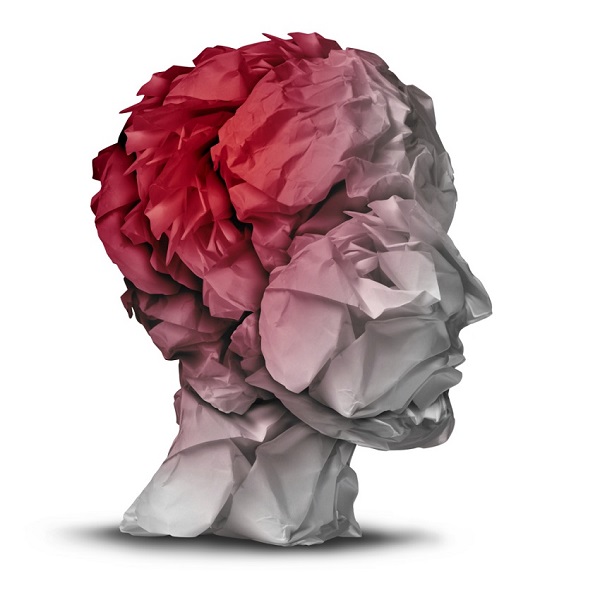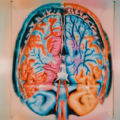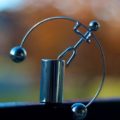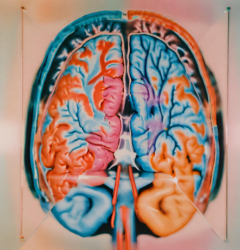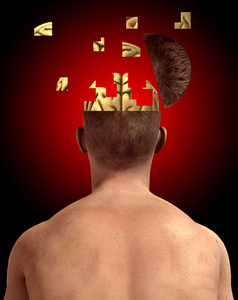Pork and Blue Sky
My first realization upon waking up from the fourteen-day coma was that I craved pork. I was sixteen, I had no clue that I was in hospital, and the patch of pale blue sky through the small window above my head held a hypnotic beauty. Later a blonde man visited. “I feel like having pork,” I told him. For weeks afterwards, my father would choke up when relating the first words I had uttered since being run over by a car. The head injuries caused me to look like an extra in a zombie movie, and upon my submission, neurologists felt compelled to prepare my family for the worst. “We don’t know if she’s going to make it,” they cautioned, “and if she does, it could well be with limited brain function.” After this grave preliminary prognosis, my banal announcement after waking up seemed miraculous to everyone.
After the brain and head swelling had sufficiently subsided, a battery of tests and scans confirmed the diagnosis of traumatic brain injury (TBI) to the left frontal cortex due to severe concussion. There was also evidence of brain hemorrhaging, which was speculated to have been relieved by an injury that allowed for the blood to drain through my left Eustachian tube. To this day, I have a constant ringing in the left ear but without affected hearing; like with other parts of my body, the TBI turned out to be less severe than it seemed at first. Doctors considered me a ‘freak patient’ who proved the exception to most every rule in their textbooks, and were amazed. My family was relieved and grateful when I started appearing to be my old self again after a few months. Yet, for me the world was a different place after the accident
Who Are You?
I didn’t feel like ‘my old self’ at all. In fact, I didn’t know the person in the mirror and would stand for long periods in front of it, astonished at ‘meeting’ myself again. I still have no recollection of the accident itself, and it took time before I would recognize faces and remember names of even those close to me.
The Black Fog of Traumatic Brain Injury
I struggled to walk in the beginning, partly due to then-undiagnosed knee and back injuries, and needed assistance with eating, but fortunately these functions were soon regained. However, I felt socially very awkward and disoriented. I consciously mimicked others’ behavior to fit in and appear normal – a stressful and exhausting exercise, so I mostly preferred to be alone or with only my family. Another enduring change in behavior was my sleeping patterns, which had me going to bed as early as 7:00 at night, and sleeping till 9:00 the next morning. These, together with mood swings, raised my parents’ concern. I was sent to see a psychologist for assessment, but the absentminded man declared me fit and fine after about 30 minutes. Yet, to me it was like a black fog had enveloped my head in a miserable snuggle. I remember feeling simultaneously amazed and despairing that a professional was unable to spot how tired, unfocused and unhealthy I felt.
After my miraculous survival, this was unfortunately the dark lens through which I saw the world, with the feelings intensifying over time. Despite this, I functioned well. I finished school, completed a four-year Higher Diploma with distinction, and could work and fully support myself. Yet, one night when sitting on the bed in my dark flat and gazing over a sleeping city, I thought for the first time: “I wish I was dead.” It was over a decade after the accident.
The Black Dog: Depression and Traumatic Brain Injury
This memory stands vividly because till then, suicidal thinking and death ideation were foreign to me. It also marked a moment of registration that I desperately needed to feel better – death for me had brushed too closely before to flirt with. It was not going to be easy, though. I was in my late twenties, yet still excruciatingly insecure and unsure of myself in many situations. I felt like a boat aimlessly adrift on life’s ocean, and often didn’t have either physical or psychological energy to follow through on new endeavors. I had one or two close friends, but still I avoided social gatherings, and romantic relationships were difficult to navigate at best. I was furthermore assailed with feelings of worthless, and my mantra was a helpless “I can’t…” It was undiagnosed at the time, but by now Horace’s proverbial black dog (depression) had joined the black fog.
Enter Nutritional Therapy
My first breakthrough came when a friend gave me a bottle of yellow, strong-smelling supplements, suggesting that it would help with stress. It colored my urine, and caused the brain fog to lift momentarily for the first in a very long time. The relief was indescribable, and I guess it could be said that that excellent B-Co-and-herbal supplement launched my journey of conscious healing from traumatic brain injury. I’m happy to add that I haven’t looked back since, so to speak. I will proceed to discuss some of the nutritional therapies I had found most helpful over time, but the list is by no means exhaustive. Also, I’m not a medical doctor, so especially in the case of grave illness, a qualified health practitioner be consulted before any complementary medicine is taken.
As with all things – better the quality, better the outcome. I strongly advise investment in well-researched and reputable supplements for optimal results.
Beautiful Bees
It is well known that the eight vitamin Bs are central nervous system (CNS) and brain nutrients par excellence. Deficiencies are associated with mental disorders as serious as dementia and schizophrenia, and I can recommend taking a good vitamin B-complex for especially depression and fatigue due to prolonged stress. Interestingly, pork is rich in vitamin B1/thiamine. My clever body had known what it needed. Vitamin B6/pyridoxine is also known for its anti-inflammatory effect on the brain. As mentioned, taking the vitamin B-Co-herbal supplement for the first time was CNS bliss! However, without a certain magical mineral, the relief and energy vitamin Bs offered were unsustainable.
Magical Magnesium
Magnesium is crucial for proper cellular function and vitally important for the central nervous system’s healthy functioning. A deficiency can cause everything to go out of whack. Mineral deficiencies have multiple causes, and for me it was prolonged, covert stress due to TBI, and estrogenic birth-control pills. The first dose alone caused me to feel as vital and alive as one would, jumping in cold water after years in a sweltering desert; it was magical and shocking! Magnesium supplementation is contraindicated for those with severe renal impairment.
Ooooh-Mega-3
Omega-3 is a fatty acid that the body doesn’t synthesize, and deficiency is caused by an over-consumption of Omega 6 foods. Severe lack of omega-3 can cause chronic inflammation which, in turn, can result in a host of serious health issues. Supplementation has proven its worth in treatment of many diseases, including depression, bi-polar disorder, ADHD and dementia, and there is strong evidence of its neurorestorative properties for treating traumatic brain injuries. Diabetics and persons on anti-coagulants or medication for cardiovascular diseases should take omega-3 supplements only under medical supervision. I found supplementing omega-3 in the form of a high-quality fish oil or cold-pressed flaxseed oil to be soothing and mood-balancing.
Homeopathy-happy
Despite its reputation as a scientific pariah, homeopathy is worldwide exceedingly popular as a natural treatment, and holds a special place in my heart. For me it was first to point to a causal link between traumatic head injuries and depression, and there is evidence of its efficacy in treating mild TBI. For me, the remedies helped immensely. Only qualified homeopaths can diagnose patients and dispense homeopathic remedies, which are always patient-specific.
The Edge Effect
Dr. Eric Braverman and his PATH clinic for brain health are controversial and often get bad press. I cannot vouch for either the good doctor or his clinic, but I believe that following the supplement and dietary advice in his book, The Edge Effect, saved me from a sure breakdown during a period of catastrophic and prolonged stress. Through questionnaires, Braverman determines a person’s temperament according to the actions of four neurotransmitters. Based on the results, he provides a list of temperament-specific supplements and diets as means to maintain mental balance and neural health. The ketogenic diet prescribed for my Acetyl-choline temperament is one I naturally gravitate to, and it’s also one on which I maintain a good weight, feel the most energised and think the sharpest. Braverman, in addition, claims that his diet and supplements slows down brain aging.
Growing Older: Dementia, TBI, and Nutrients
The astute reader would have noticed that ‘dementia’ popped up several times, a brain-degenerative disease usually associated with older people. It deserves mention because there is evidence that TBI elevates risk for developing dementia. Nutritional therapy works preventively against brain aging, and can sometimes even reverse age-related symptoms. It can usually be started with good effect at any age, but is not a magic bullet. An elderly person should never be given supplements without consultation with their doctor first, and it is especially important to discern when home care becomes necessary. My father was recently diagnosed with vascular dementia, which is hereditary and, if anything, this spurs me to take even better care of my precious grey matter. It certainly deserves it, given its hard work on this journey healing from traumatic brain injury.
We Need Your Help
Hormones Matter needs funding now. Our research funding was cut recently and because of our commitment to independent health research and journalism unbiased by commercial interests we allow minimal advertising on the site. That means all funding must come from you, our readers. Don’t let Hormones Matter die.
